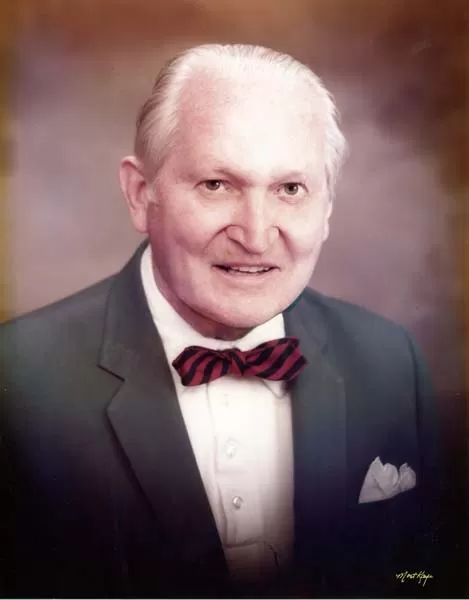Walter Stanley Gubelmann (1908-1988) was born in Buffalo, New York, the only son of William S. and Juliette E. Metz Gubelmann. William invented vital parts for adding machines and cash registers. His patents were granted in 1917, which coincided with the increased demand of those business machines during World War I. Burroughs, Underwood, and National Cash Register all made use of his inventions.
In 1936 William Gubelmann bought a former Swedish training ship and christened her Seven Seas. The following year, Walter was aboard the 168-foot yacht to make sailing history: the first formal race between two privately owned square-rigged windjammers under yacht pennants. The second ship, Joseph Conrad, won the race from Newport, Rhode Island, to Bermudaóby only fifty-five seconds.
Walter married Ann Barton Green in 1941. Two weeks after their honeymoon, the Japanese bombed Pearl Harbor, and Walter, a captain in the Army Reserves, was called to duty. Walter and Barton bought their first house in Palm Beach. During the summer season, they lived in Oyster Bay, Long Island and Newport. Walter took his father’s love of sailing to its highest level. During the 1950s and ’60s, his 73-foot yawl Windigo performed admirably in the 475-mile biennial Annapolis-Newport Race of the American Yacht Club. In 1955 Sports Illustrated wrote of the “delicate touch” of “gentle Sportsman Gubelmann” that won him the 359-mile Gotland race in the Baltic Sea.
In 1964 Gubelmann formed a syndicateóincluding Palm Beachers Harold Vanderbilt, George F. Baker, Jr, and Briggs Cunningham IIóand successfully defended the America’s Cup from England’s Royal Thames Yacht Club. Gubelmann’s determination in achieving this success typifies what his son William remembers best about his father. “When he decided to do something, he put his nose to the grindstone and got it done. ”
In 1987 Walter and Barton were inducted together into the Hall of Fame of the U. S. Croquet Association, which said of Walter: “No one has lent more to this heritage of gentility and social grace. More than his past presidencies of the Newport Croquet Club and the Newport Casino Croquet Blub, Walter is, and always will be, referred to as the ‘Chairman of the Board of Newport Croquet. ‘”
The Gubelmanns also enjoyed skeet shooting. An unusually challenging course on Long Island named each of its twelve stations for a regular shooter who found it to be his special nemesis; one was named Gubelmann’s Gloom.
While they became full-time Palm Beach residents in the 1970s, their community involvement began much earlier. In 1958 A. Atwater Kent, Jr. persuaded the Gubelmanns to join the Society of the Four Arts Board of Trustees. For many years, the Society had hoped to acquire three lots on Royal Palm Way east of its gardens. In 1965 members learned that one of the lots was about to be sold. Two days before the sale was to close, Gubelmann led the move to convince the seller to sell to the Society at the contracted price. In just one weekend, pledges for the required amount were raised by telephone. The following year, Gubelmann became president, a position he held until 1988. During his tenure, the remaining lots were acquired and developed into the present Sculpture Garden with the help of preservationist-artist Philip Hulitar. Gubelmann was memorialized in the naming of the Walter S. Gubelmann Auditorium, the endowment of the Walter S. Gubelmann Memorial Lecture, and the dedication of the tarpon sculpture in the fountain at the Society’s Gallery Building.
Gubelmann was founder-president of Realty and Industrial Corporation, which handled the family’s patents, securities, and real estate. Today Walter and Barton’s two sons, William S. and James Barton Gubelmann, manage the assets through the Constellation, LP in West Palm Beach. William also raced Formula Two cars and has two children. Marjorie has a son, Cyrus; and Wyeth has a daughter, Rose. James has twin girls, Tantivy and Phoebe, and a son, James, Jr. ; and has two grandchildren, Lily and Stokes.
Walter Gubelmann died July 28, 1988, in Newport at the age of eighty.


